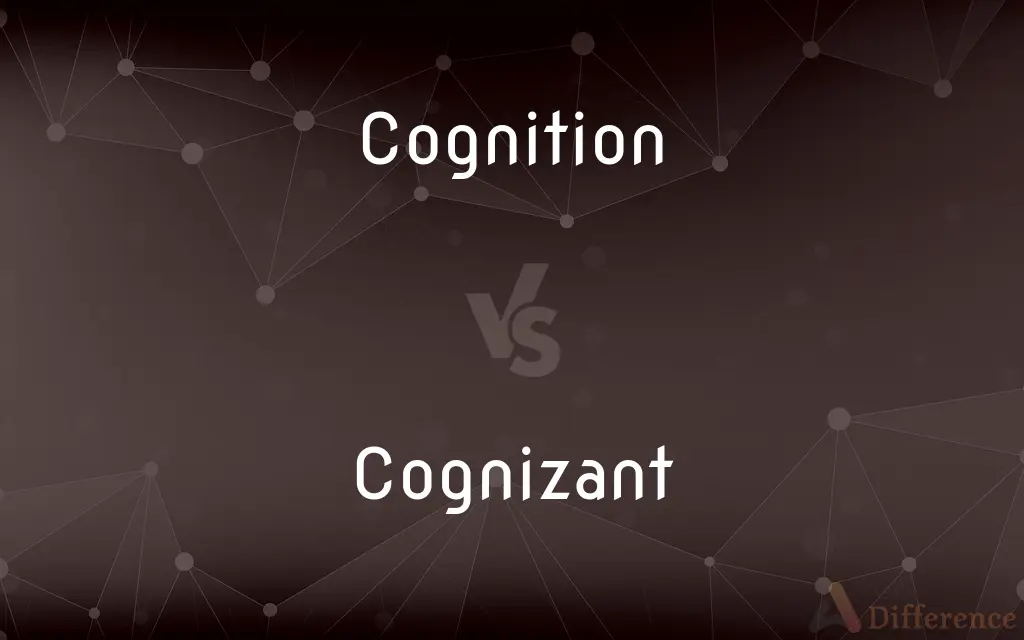Cognition vs. Cognizant — What's the Difference?
By Fiza Rafique & Urooj Arif — Updated on April 26, 2024
Cognition refers to the mental processes of acquiring knowledge and understanding through thought and experiences, while being cognizant means being aware of or having knowledge of something.

Difference Between Cognition and Cognizant
Table of Contents
ADVERTISEMENT
Key Differences
Cognition encompasses a range of mental activities including thinking, understanding, learning, and remembering. Whereas being cognizant refers specifically to the state of being aware of or having knowledge about particular facts or situations.
Cognition is studied in various scientific fields like psychology and neuroscience, which examine how individuals perceive, process, and recall information. On the other hand, being cognizant is a condition or state of awareness that an individual experiences, often discussed in contexts involving consciousness and alertness.
Cognitive processes are essential for making decisions, solving problems, and interacting effectively in social environments. Meanwhile, being cognizant impacts how one reacts to immediate situations or information, influencing decisions based on current awareness.
Cognition can be subconscious or unconscious, as many cognitive processes occur without deliberate thought. Conversely, being cognizant implies a conscious awareness, where the individual is actively aware of specific information or conditions.
Cognitive abilities can develop and change over time due to factors like education, health, and aging, affecting how a person thinks and understands the world. In contrast, being cognizant is more situational, varying depending on context and specific information one is exposed to at any given time.
ADVERTISEMENT
Comparison Chart
Definition
Mental process of acquiring knowledge
Awareness of certain facts
Related Fields
Psychology, neuroscience
Psychology, philosophy
Key Characteristics
Involves thinking, understanding
Involves awareness, consciousness
Dependence
Can be subconscious
Always conscious
Development
Develops over time
Situational and immediate
Compare with Definitions
Cognition
Involves both conscious and subconscious processes.
Some cognitive processes, like perception, occur without conscious effort.
Cognizant
Always involves conscious awareness.
One must be cognizant of their surroundings while driving.
Cognition
Broadly studied in psychology and neuroscience.
Studies on cognition can help understand how memory deteriorates with age.
Cognizant
Relates to being informed or enlightened.
As a journalist, staying cognizant of current events is essential.
Cognition
The mental action of acquiring knowledge through experience, senses, and thought.
Cognition involves processes such as memory, learning, and problem-solving.
Cognizant
Being aware of or having knowledge about something.
She was cognizant of the risks involved in the procedure.
Cognition
Essential for complex decision making.
Good cognition is crucial for tasks that require complex thought and planning.
Cognizant
Often used to describe a person's state of mind regarding specific facts.
He remained cognizant of the time constraints during the exam.
Cognition
The mental process of knowing, including aspects such as awareness, perception, reasoning, and judgment.
Cognizant
Can be influenced by attention and focus.
Being cognizant of details can improve one's performance at work.
Cognition
Can be influenced by various factors including mental health.
Cognitive abilities can decline in conditions like Alzheimer's disease.
Cognizant
Cognizant is an American multinational technology company that provides business consulting, information technology and outsourcing services. It is headquartered in Teaneck, New Jersey, United States.
Cognition
Cognition ( (listen)) refers to "the mental action or process of acquiring knowledge and understanding through thought, experience, and the senses". It encompasses many aspects of intellectual functions and processes such as: perception, attention, the formation of knowledge, memory and working memory, judgment and evaluation, reasoning and "computation", problem solving and decision making, comprehension and production of language.
Cognizant
Fully informed; conscious.
Cognition
The mental action or process of acquiring knowledge and understanding through thought, experience, and the senses.
Cognizant
; fully informed; having understanding of a fact.
The defendant is cognizant that this is a serious charge.
Cognition
That which comes to be known, as through perception, reasoning, or intuition; knowledge.
Cognizant
; self-aware.
Cognition
The process of knowing, of acquiring knowledge and understanding through thought and through the senses.
Cognizant
Having cognizance or knowledge. (of).
Cognition
(countable) A result of a cognitive process.
Cognizant
(usually followed by `of') having knowledge or understanding;
Our youth are cognizant of the law
I am well aware of his limitations
Cognition
The act of knowing; knowledge; perception.
I will not be myself nor have cognationOf what I feel: I am all patience.
Cognition
That which is known.
Cognition
The psychological result of perception and learning and reasoning
Common Curiosities
How are cognition and being cognizant studied?
Cognition is studied through psychological and neurological experiments, while being cognizant is examined within psychological and philosophical contexts.
What is the primary focus of cognition?
The primary focus of cognition is on understanding and processing information through mental abilities.
Is it necessary to be cognizant to learn something new?
Yes, being cognizant or aware of information is essential for learning and processing that new information effectively.
What role does education play in cognition and being cognizant?
Education enhances cognition through learning and experience, and it also helps individuals become more cognizant of various topics and facts.
Can cognition function without consciousness?
Yes, some cognitive processes like perception can function subconsciously, without conscious thought.
Can being cognizant influence emotional responses?
Yes, being cognizant of emotional states or triggers can significantly influence one's emotional responses.
How does being cognizant affect decision-making?
Being cognizant affects decision-making by ensuring that decisions are informed by current awareness and facts.
Can a person be highly cognitive but not cognizant?
Yes, a person can have strong cognitive abilities but may not be cognizant of specific details or situations.
Is being cognizant a temporary state?
Being cognizant can be both temporary or ongoing, depending on the context and the individual's focus.
What improvements can enhance both cognition and cognizance?
Improvements in education, mental health care, and lifestyle can enhance both cognition and cognizance.
Are there tools to measure cognition?
Yes, there are various cognitive tests and assessments used to measure and evaluate cognitive functions.
What might cause a decrease in cognizance?
Decreased cognizance can be caused by factors like distraction, fatigue, or neurological impairments.
Does aging affect cognition and cognizance equally?
Aging can affect both, but its impact on cognition can be more profound, influencing memory, problem-solving skills, and learning capabilities.
How do cognitive impairments affect awareness?
Cognitive impairments can affect how aware a person is of their surroundings or specific facts, impacting their overall cognizance.
What distinguishes cognition from general intelligence?
Cognition refers specifically to the mechanisms of acquiring knowledge and understanding, while general intelligence is a broader measure of one's ability to think, reason, and solve problems.
Share Your Discovery

Previous Comparison
Eddy vs. Vortex
Next Comparison
Orthoclase vs. PlagioclaseAuthor Spotlight
Written by
Fiza RafiqueFiza Rafique is a skilled content writer at AskDifference.com, where she meticulously refines and enhances written pieces. Drawing from her vast editorial expertise, Fiza ensures clarity, accuracy, and precision in every article. Passionate about language, she continually seeks to elevate the quality of content for readers worldwide.
Co-written by
Urooj ArifUrooj is a skilled content writer at Ask Difference, known for her exceptional ability to simplify complex topics into engaging and informative content. With a passion for research and a flair for clear, concise writing, she consistently delivers articles that resonate with our diverse audience.














































